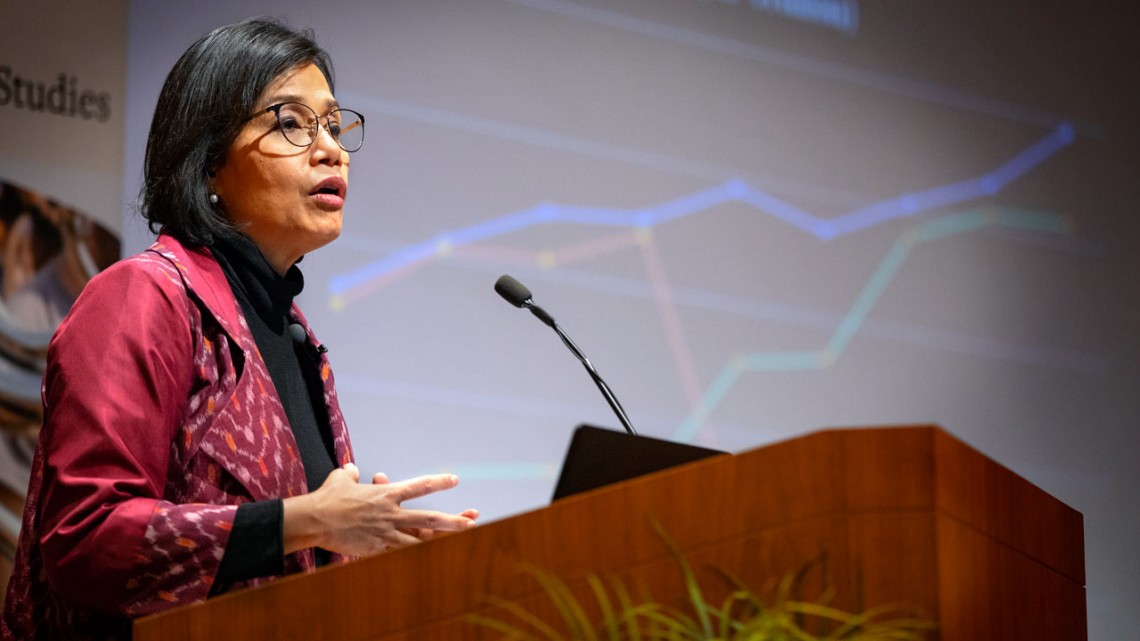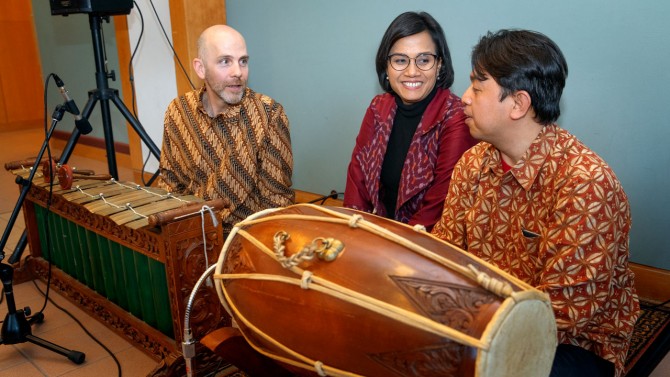
Sri Mulyani Indrawati, the Republic of Indonesia’s minister of finance, gives the 2019 Bartels World Affairs Lecture April 10.
Bartels lecturer outlines how developing countries can build human capital
By Susan Kelley
The current Fourth Industrial Revolution, with its emphasis on digital technology, offers a great opportunity for developing countries to thrive economically. But their success will hinge on their ability to strengthen their institutional capacity and human capital.
Countries including Indonesia, which has one of the fastest growing economies in the world – can offer examples of how to go about it, said the Republic of Indonesia’s minister of finance.
Sri Mulyani Indrawati, known as an adroit economic reformer, delivered this year’s Bartels World Affairs Lecture April 10 in the Biotechnology Building, hosted by the Mario Einaudi Center for International Studies and Southeast Asia Program.
“One thing is for sure: To make the best of Industry 4.0, developing countries must continue to improve the quality of human capital,” said Sri Mulyani, who has served as minister since 2016. She previously served in the same post from 2005-10, steering Southeast Asia’s largest economy through the global financial crisis and its aftermath.
“Only through investment in human capital can countries avoid a digital divide and inequality as well as anticipate changes in business models and prepare for the jobs of tomorrow,” she said.
Digitization – including technology, data and communication – is the largest driver of the global economy, she said. Success stories from Indonesia include Go-Jek, a transportation network and logistics company whose motorbike drivers transport people across cities, shop for groceries and make deliveries. Its 900,000 drivers serve 15 million customers monthly in Indonesia.
The country aims to support the growth of companies like these and become an advanced economy by 2045, she said. To do so, it is focusing on 10 strategies, from building up its national digital infrastructure to attracting foreign investment. It already has a lot going for it: a young population, strong digital technologies and a central geographic location among Asia’s rising economies, Sri Mulyani said.
It also has strong sustainable growth of better than 5% between 2000 and 2018 – a period that followed two significant Asian financial crises and included ripple effects of the U.S.’s Great Recession. Its social welfare indicators show poverty and unemployment are diminishing.
But strengthening the quality of Indonesia’s human capital will be key to driving the country’s digital and economic transformation, she said.
To do so, Indonesia is building out its internet infrastructure. Its 17,000 islands will be connected to the internet, via satellites now under construction, by the middle of this year. “Many developing countries may not yet have the ability to build the infrastructure that allows them to reap the benefit of this industrial revolution,” she said.
It has significantly shifted its budget priorities toward education, with a whopping 40 percent increase in education spending between 2014 and 2019. It has also boosted its infrastructure spending by nearly 170 percent, and its health spending by 106 percent, during that period.
Its education spending includes more resources for increased access to higher education; cash transfers to poor families for education, scholarships and tax exemptions for books; and incentives for vocational training.
The government has allocated 5% of its budget to health services. Priorities include a focus on childhood growth stunting, which continues to be a major problem, as well as health facilities, universal health coverage and the elimination of malaria.
To fund these programs, Indonesia must continue to strengthen its tax system. “Tax reform is one of the most important elements of our ability to sustain economic development,” she said.
Indonesia has diversified its economy beyond its dependence on natural resources, Sri Mulyani said, but challenges remain. “Infrastructure and institutional reform is very critical,” she said, “and the most critical is human capital development.”
The Henry E. and Nancy Horton Bartels World Affairs Fellowship brings distinguished leaders in the international community to Cornell.
Media Contact
Get Cornell news delivered right to your inbox.
Subscribe
